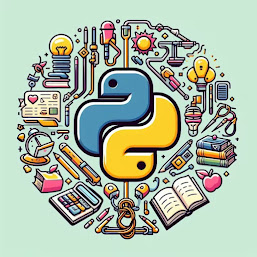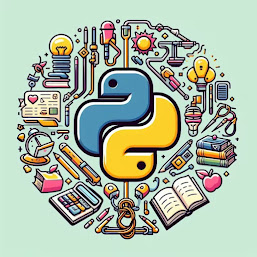What are the important 15 Python Builtin-Functions You Should Know as a Beginner?
 |
| 15 Python Builtin-Functions You Should Know |
What should you do as a Python Beginner?
As a beginner in Python programming, it's important to familiarize yourself with the built-in functions that are essential for writing efficient and clean code. In this article, we will explore 15 Python built-in functions that you need to master in order to become proficient in the language.
You will notice in the examples below - most of them at least - that we did not give you the output. Use the keyboard and apply them on a file, and let's call it main.py. You are a programmer now, not a normal person to read and watch only.
And now, let's begin...
1. `print()`:
This function is used to display the output of a program. It is a fundamental function that allows you to showcase results and information to the user.
Example:
print("Hello, World!")
name = "Alice"
print("Hello,", name)
print("Hello, World!")
name = "Alice"
print("Hello,", name)
2. `input()`:
The `input()` function stops the program and allows you to accept user input, which can be used to make your programs interactive and dynamic. Important to note that the returned data are always of the type str or string.
Example:
3. `len()`:
This function returns the length of an object, such as a list, string, or dictionary. It is a powerful tool for working with data structures.
Example:
4. `type()`:
The `type()` function allows you to know the data type of an object or a variable. This is useful for debugging and ensuring that your code is handling the correct types of data.
Example:
5. Type Conversion with `int()`, `float()`, `str()`:
These built-in functions are used for type conversion or type casting. They allow you to convert between different data types, such as converting a string to an integer or a float. make sure that the data is convertable to avoid errors, as you cannot convert "a" to an int.
Example:
6. `max()`, `min()`:
These functions are used to find the maximum and minimum values in a given iterable, such as a list or tuple.
Example:
numbers = [1, 2, 3, 4, 5]
print("Max:", max(numbers))
print("Min:", min(numbers))
7. `sum()`:
The `sum()` function returns the sum of all the elements in an iterable, such as a list or tuple. It is a handy tool for performing arithmetic operations on collections of numbers.
Example:
8. `range()`:
This function generates a sequence of numbers within a specified range. It is commonly used in loops and for creating lists of numbers.
Example:
9. `sorted()`:
The `sorted()` function returns a new sorted list from the elements of any iterable. It is useful for sorting data in ascending or descending order.
Example:
10. `any()`, `all()`:
These functions are used to check if any or all of the elements in an iterable are True. They are handy for performing logical operations on collections of Boolean values.
Example:
11. `zip()`:
The `zip()` function is used to combine multiple iterables into a single iterable of tuples. It is useful for iterating over multiple collections simultaneously.
Example:
12. `enumerate()`:
This function adds a counter to an iterable and returns it as an enumerate object. It is helpful for keeping track of the index while iterating over a collection.
Example:
13. `map()`, `filter()``:
These built-in functions are part of the functional programming tools in Python. They allow you to apply a function to elements in an iterable and filter elements based on a condition, respectively.
Example:
14. `open()`, `close()`:
These functions are used for file input and output operations. They allow you to open and close files for reading and writing data. In the example below, you will notice that we did not use the function close() as when we start with the keyword "with", it does the closing for the file and saving us from memory leake.
Example:
15. `help()`, `dir()`:
These functions provide information about objects and modules in Python. They are useful for exploring the functionality of built-in and user-defined objects.
Example:
Mastering these 15 Python built-in functions will provide you with a strong foundation for writing efficient and effective code in Python. These functions, and later when you learn how arrays work, such as dictionaries, sets, tuples and lists, you will be able to learn any framework easily such as Flask, Django, etc.


0 Comments
Your opinion matters, your voice makes us proud and happy. Your words are our motivation.